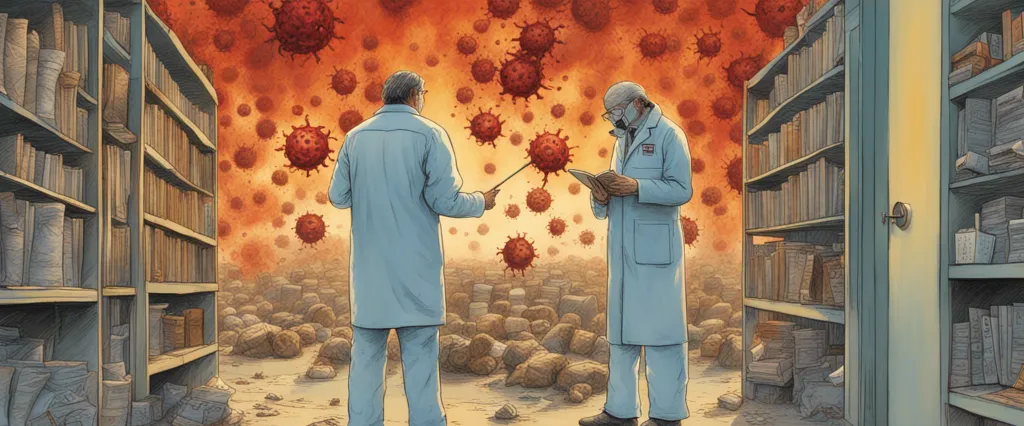
In the realm of non-fiction literature, certain captivating narratives have the power to immerse readers into worlds both fascinating and terrifying. Two such works, Richard Preston’s “The Hot Zone” and Patrick Radden Keefe’s “Empire of Pain,” delve into true stories fraught with danger, turmoil, and ethical dilemmas. Expanding upon these narratives, this comparative study aims to explore the contrasting elements found within these two books, ultimately tracing their common threads of human vulnerability and the impact of individual choices.
The Hot Zone” delves into the frightening and dangerous world of viral outbreaks. Serving as a spine-chilling account of deadly pathogens, Preston recounts the emergence and containment of contagious and lethal viruses, most notably the Ebola virus. Set against the backdrop of real-life events and scientific investigations, the book raises thought-provoking questions about mankind’s readiness to combat the threat of pandemics and the ethical complexities that arise in the face of such crises. Preston’s meticulous research and vivid storytelling make “The Hot Zone” an enthralling exploration of the devastating consequences of infectious diseases.
On the other hand, “Empire of Pain” ventures into the realm of corporate greed and the repercussions of the opioid crisis. Patrick Radden Keefe weaves a meticulously researched narrative chronicling the rise and fall of the Sackler family, whose pharmaceutical empire reaped enormous profits from the aggressive marketing of OxyContin. Keefe delves deep into the complex web of wealth, power, and the unethical practices behind the opioid epidemic. By uncovering the intricate ties between pharmaceutical companies, regulatory agencies, and medical professionals, Keefe exposes the dark underbelly of profit-driven motives at the expense of public health and societal well-being.
Despite their unique subject matters, these books share a common focus on the human experience and the consequences of individual actions. “The Hot Zone” highlights the frailty of humanity in the face of deadly diseases, exploring the vulnerabilities and fears that pervade both scientific and ordinary communities. In contrast, “Empire of Pain” showcases the profound impact of individual choices on a grand scale, exposing the harm inflicted upon countless lives by a few influential figures in pursuit of wealth and power.
As we embark upon this comparative study, we will delve into the distinctive ways in which the authors tell their stories. We will analyze the narrative techniques employed, the ethical questions raised, and the lasting impact of these remarkable non-fiction works. By examining these two books side by side, we hope to gain a deeper understanding of the resilience and vulnerability of humanity, as well as the profound consequences of individual decisions in our increasingly interconnected world.
Brief Summary of Two Books
The Hot Zone by Richard Preston
“The Hot Zone” by Richard Preston is a non-fiction book that tells the gripping story of the origins and spread of deadly viruses, specifically focusing on Ebola and Marburg viruses. The narrative begins with a mysterious outbreak at a research facility in Reston, Virginia, where a deadly strain of Ebola virus is discovered in imported monkeys. As the story unfolds, the book delves into the history and potential devastating impact of these highly contagious and deadly viruses, and the efforts of scientists and medical professionals to contain and understand them. Preston also explores the personal stories of those who were directly involved in studying and combating these viruses, including the risks they faced and the ethical dilemmas they encountered. Written in a suspenseful and scientifically accurate manner, “The Hot Zone” sheds light on the terrifying reality of viral outbreaks and the constant battle against emerging diseases.
Empire of Pain by Patrick Radden Keefe
“Empire of Pain” by Patrick Radden Keefe is a meticulously researched and gripping non-fiction book that delves into the rise and fall of the Sackler family, the secretive owners of Purdue Pharma, the pharmaceutical company behind OxyContin. Keefe traces the origins of the Sackler family from their humble beginnings as immigrant entrepreneurs to their ascent as one of the wealthiest and most influential families in America.
The book explores how the Sacklers built their empire through marketing tactics and aggressive promotion of OxyContin, a highly addictive painkiller. Keefe unveils the family’s relentless pursuit of profits, even in the face of mounting evidence that their product was causing widespread addiction, overdose deaths, and a devastating opioid crisis across the United States.
Keefe’s research draws on court documents, internal corporate communications, and interviews with former employees and victims of the opioid epidemic to paint a comprehensive and damning portrait of the Sacklers. He highlights their deliberate efforts to downplay the dangers of OxyContin, their manipulation of medical professionals, and their influence over regulatory agencies.
The book also explores the legal battles faced by the Sackler family as multiple states and municipalities sued Purdue Pharma for its role in fueling the opioid crisis. Keefe delves into the complex web of legal strategies employed by the family to shield their wealth and reputation from scrutiny.
Ultimately, “Empire of Pain” offers a searing critique of corporate greed, the failures of regulatory systems, and the devastating impact of the opioid crisis on individuals and communities. Keefe’s writing masterfully weaves together the personal stories of victims, the intricate details of corporate malfeasance, and the larger societal implications of the Sackler family’s actions.
Comparison between Two Books

Similarities in Social Documentary
The Hot Zone by Richard Preston and Empire of Pain by Patrick Radden Keefe are both examples of social documentary books that highlight various aspects of society with a focus on real events and their consequences. Despite their differences in subject matter, there are several similarities in the social documentary approach taken by both authors.
1. In-depth research: Both books display a meticulous research process, where the authors have investigated their respective topics extensively. They rely on a wide range of sources, including interviews, documents, and historical records, to provide a comprehensive understanding of the events they depict.
2. Impact of societal issues: Each book examines how societal issues have far-reaching consequences. In The Hot Zone, Preston explores the potential threat posed by deadly viruses, such as Ebola, and the ways in which they can impact society on a global scale. Empire of Pain focuses on the opioid crisis in the United States and illustrates how this issue spans across different social strata, affecting individuals, families, communities, and even the economy.
3. Personal narratives: Both books utilize personal narratives to humanize the larger social issues they address. They do not simply present dry facts and statistics but incorporate personal stories of individuals impacted by the events. By including these narratives, the authors create an emotional connection for the readers and allow them to empathize with the subjects.
4. Ethical considerations: The authors explore the ethical dimensions surrounding their topics. In The Hot Zone, Preston delves into the ethical considerations of containment and research on deadly viruses. In Empire of Pain, Keefe examines the ethical implications of pharmaceutical companies marketing and promoting addictive opioids. By addressing these ethical dilemmas, the authors prompt readers to question and reflect on the broader societal implications.
5. Timeliness and significance: Both books capture important moments in recent history that had a substantial impact on society. The Hot Zone discusses pivotal outbreaks of deadly viruses, including Ebola, that shaped global health policy and awareness. Empire of Pain sheds light on the recent opioid crisis, offering insights into the machinations of the pharmaceutical industry and its contribution to the epidemic. The timeliness of these subjects strengthens the books’ relevance as social documentaries.
In summary, although The Hot Zone by Richard Preston and Empire of Pain by Patrick Radden Keefe focus on different topics, the similarities in their social documentary approach lie in their in-depth research, exploration of societal impact, inclusion of personal narratives, examination of ethical considerations, and timeliness and significance of the issues they address.
Divergences in Social Documentary
The Hot Zone by Richard Preston and Empire of Pain by Patrick Radden Keefe are two non-fiction books that explore different aspects of social documentary. While both books can be categorized as works of social documentary, they diverge in terms of focus, scope, and narrative style.
The Hot Zone can be described as a medical thriller that delves into the outbreak and containment efforts surrounding contagious diseases such as Ebola. Preston combines scientific research, personal stories, and historical context to create a gripping narrative. Although he weaves in elements of social documentary, such as explaining the impact of these diseases on communities and the actions taken by public health organizations, the primary focus of The Hot Zone is on the scientific and medical aspects of the story. Preston’s goal is to both inform and captivate readers through an engaging storytelling approach.
On the other hand, Empire of Pain by Patrick Radden Keefe primarily focuses on the social impact of the Sackler family’s involvement in the opioid crisis. Keefe adopts a more traditional approach to social documentary, utilizing extensive research, interviews, and a chronological account of events to trace the history of the Sackler family’s pharmaceutical empire and its role in fueling the opioid epidemic. The book emphasizes the societal consequences, highlighting the devastation caused by addiction, the influence of corporate interests, and the systemic failures in addressing the crisis. Keefe’s objective is to shed light on the wider social and ethical implications of the opioid epidemic.
In terms of scope, The Hot Zone tends to be more targeted and specific, primarily focusing on the origins, spread, and containment of contagious diseases. It provides a captivating exploration of the scientific and medical dimensions of these diseases, while offering glimpses into the societal impact. Empire of Pain, however, takes a broader approach, examining the complex interplay between capitalism, politics, medicine, and the devastating societal consequences of the opioid crisis.
Regarding narrative style, The Hot Zone employs a more suspenseful and dramatic tone, drawing readers in with its thriller-like storytelling. Preston’s use of vivid and descriptive language creates a sense of urgency and fear. In contrast, Empire of Pain adopts a journalistic approach, presenting facts, testimonies, and historical context in a clear and straightforward manner. Keefe’s writing style aims to present a comprehensive and sobering account of a complex social issue.
In conclusion, while both The Hot Zone and Empire of Pain fall under the realm of social documentary, they diverge significantly in terms of focus, scope, and narrative style. The Hot Zone leans more towards a medical thriller, while Empire of Pain is a meticulously researched exposé on the social impact of the opioid crisis. Understanding these differences allows readers to appreciate the varied approaches social documentary authors can take to shed light on critical issues.

Conclusion
Both The Hot Zone by Richard Preston and Empire of Pain by Patrick Radden Keefe are highly regarded and worthy of reading, but the choice ultimately depends on your interests and preferences.
The Hot Zone is a non-fiction thriller that delves into the world of highly contagious and deadly viruses, particularly the Ebola virus. It provides a gripping account of the outbreak and containment efforts, and offers a fascinating look into the field of virology. If you enjoy suspenseful narratives based on real events and want to learn more about infectious diseases, this book is a great choice.
On the other hand, Empire of Pain is a meticulously researched and extensively detailed exploration of the Sackler family, the makers of OxyContin, and their role in the opioid crisis. It delves into the history of the family, their business practices, and the devastating consequences of the opioid epidemic. If you are interested in exploring the dark side of the pharmaceutical industry, the moral implications of capitalism, and the impacts of addiction, this book is a compelling read.
Both books have received critical acclaim, and they offer different subject matters to engage with. Consider your interests and what topic intrigues you more, and make your decision based on that.


